|
|
|
Sort Order |
|
|
|
Items / Page
|
|
|
|
|
|
|
| Srl | Item |
| 1 |
ID:
096365


|
|
|
|
|
| Publication |
2010.
|
| Summary/Abstract |
The codes of conduct of Western brand-name corporations normally require supplier factories in the Global South to comply with the local country's minimum legal wage; the codes also often stipulate a maximum sixty-hour work week. But the problems of illegally low wages and overtime violations in supplier factories remain unresolved. This article uses survey data collected in a city in South China on workers' wages and work hours to show how legal minimum wage rates, which normally are expressed in developing countries as a monthly wage, obfuscate the level of wages paid to workers. This will be demonstrated by comparing two different payment systems: time rates (which predominate in the toy industry) and piece rates (which predominate in garment manufacturing). The differences in the compensation rates and work hours resulting from the two systems lead the authors to contend that countries in the Global South and the implementers of corporate codes should calculate minimum wages in terms of hourly earnings in order to make wage payments more transparent and help reduce exploitative practices.
|
|
|
|
|
|
|
|
|
|
|
|
|
|
|
|
| 2 |
ID:
096369
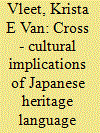

|
|
|
|
|
| Publication |
2010.
|
| Summary/Abstract |
Scholars of regions where multiple languages are spoken have much to gain by considering heritage language education, individual identity, and state power through these ethnographic and historical cases that focus on Japan and the Japanese diaspora. The articles in this two-part collection offer insights into the interrelationships of linguistic hierarchies and political economy, the navigation of ethnic and racial subjectivities, and the ways children and adolescents claim belonging to various communities through their linguistic practices. The articles interrogate not only heritage but remembrance and the ways individuals may produce identity through language in everyday interactions and institutional settings.
|
|
|
|
|
|
|
|
|
|
|
|
|
|
|
|
| 3 |
ID:
096370


|
|
|
| 4 |
ID:
096372
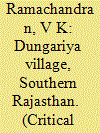

|
|
|
|
|
| Publication |
2010.
|
| Summary/Abstract |
Drawing primarily on a survey of Dungariya village in southern Rajasthan conducted in May 2007, along with interviews from mid 2009, this article provides an analytical description of household economies in a village in Kotra tehsil, Udaipur district, that is acutely impoverished by all standards of measurement.
|
|
|
|
|
|
|
|
|
|
|
|
|
|
|
|
| 5 |
ID:
096413
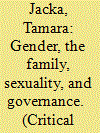

|
|
|
| 6 |
ID:
096366
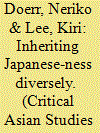

|
|
|
|
|
| Publication |
2010.
|
| Summary/Abstract |
The late twentieth century saw a rise of global discourse about heritage. Research on heritage politics, however, has shed little light on heritage practices in schools, especially regarding language, that is, how heritage language is constructed and how it is "inherited" by students of various backgrounds. Heritage language education is often viewed as a means to empower heritage language speakers or to address the diverse needs of students in language classes. In existing works, the individual's link to "heritage" is assumed as given and stable. More recent works show that the processes and effects of heritage language education are complex and nuanced due to diverse personal backgrounds and changing political economy and cultural politics. The role of schooling in the process of "inheriting" language, however, has not attracted much attention: how students are grouped or tracked into a particular class, for example. After ethnographically investigating various views and practices at a weekend Japanese language school in the northeastern United States throughout 2007 and 2008, the authors of this article argue that heritage language school is not merely a place to reproduce "heritage" by passing it on to students, but it is also a productive site where ways to imagine "heritage" and "inherit" it proliferate. The article analyzes the processes by which what would be considered as merely "speaking Japanese" and "being Japanese" outside heritage language school are differentiated into diverse ways of being Japanese. It suggests a need to investigate school as a site of heritage politics as well as a need for researchers and practitioners to view heritage language education not only as a way to teach language but also as a means to gain an understanding of heritage politics.
|
|
|
|
|
|
|
|
|
|
|
|
|
|
|
|
| 7 |
ID:
096368


|
|
|
| 8 |
ID:
096367


|
|
|
| 9 |
ID:
096412


|
|
|
|
|
| Publication |
2010.
|
| Summary/Abstract |
This article is constructed as three narratives that are situated within the distinct and separate spatio-temporal contexts of social activism and research of the three contributors. Each contributor's role and position within this context has inflected his/her discursive approach, ranging from a polemical stance to one of empiricism and reflexivity. The article thus presents multiple modes of writing, analysis, and engagement, drawing on participant-observation to oral history documentation, activist experience, and field survey. The trajectory of each contribution is linked and we aim to provide a cohesive account in three voices, offering imbricated views of a pedagogical context in an extremely poor, Muslim slum in Howrah, West Bengal, India. This article-cum-photo essay is also an illustration of how collaborative writing - inclusive of activist experience and academic research - can address the issues of poverty and hope as it examines the role of education in such a context.
|
|
|
|
|
|
|
|
|
|
|
|
|
|
|
|
| 10 |
ID:
096371
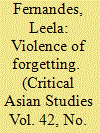

|
|
|
|
|
| Publication |
2010.
|
| Summary/Abstract |
This introduction to two field reports on specific cases of poverty in rural and urban India argues that poverty is produced and mediated through intersecting structures of inequality such as caste, religion, tribe, and gender. The reports, the author notes, remind us that understanding the macro processes and current effects of globalization requires a practice of knowledge that values the details, specificities, and immersion in particular places such as those described in the reports by V.K. Ramachandran and V. Ramaswamy et al
|
|
|
|
|
|
|
|
|
|
|
|
|
|
|
|
|
|
|
|
|